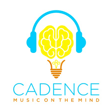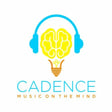Become a Creator today!Start creating today - Share your story with the world!
Start for free
00:00:00
00:00:01

Episode 08: The Clocks in Your Brain
In this episode we continue our exploration of how musicians tell time and how anyone embodies pulse. We talk to Dean Buonomano, a neuroscientist who studies time at UCLA and we hear from previous guests: music cognition researcher Jessica Grahn, percussionist Jack van Geem, and film director Jonathan Lynn.
Transcript
Introduction to Time in Music
00:00:00
Speaker
Welcome back to Cadence, the podcast where we explore what music can tell us about the mind. I'm Andrea Viscontes.
00:00:07
Speaker
Last week, we started to talk about time, how musicians process time, how non-musicians react to it in music, and what's happening in the brain. But there's still a lot more to explore, so we're going to continue talking about time in this episode. Time is one thing that all music has in common, and it unfolds over time. And that way, it's different from vision, for example, although you could argue that vision is also about time, about what's changing in the visual world.
00:00:35
Speaker
But the relationship between time and hearing is much more specific and direct.
Podcast Recommendation: 'Bite' by Mother Jones
00:00:53
Speaker
But before we get into the meat of the episode, I want to let you know about another podcast you might enjoy. It's called Bite, and it's from Mother Jones. It's for people who think hard about their food. You can join food and farming blogger Tom Philpott, editors Kira Butler and Maddie Oatman, and a tantalizing guest list of writers, farmers, scientists, and chefs as they uncover the surprising stories behind what ends up on your plate.
00:01:17
Speaker
In their first season, they found out what happens when restaurants ditch tipping, learned about all the fraudulent food in your kitchen cabinet, discovered what goes into a nasty woman cocktail, and more. CNN called Bite one of the best food podcasts of 2016. Subscribe on iTunes, Stitcher, or wherever you get your podcasts.
Timing in Music and Comedy
00:01:37
Speaker
Whether or not you have a sense of pulse or rhythm is a very key characteristic of how musical you are. I mean, think about your friends who seem not to have much rhythm. You automatically assume they're also not very musical. So timing is something that we think about a lot as musicians, but most people don't think about timing when it comes to the verbal arts, like acting, for example.
00:02:01
Speaker
But in some of my earlier conversations with the film and television director, Jonathan Lynn, I realized that, in fact, timing is an essential part of comedy. Now, you might remember Jonathan Lynn from a previous episode. He directed movies like Clue and My Cousin Finney, Nuns on the Run. He also wrote the very famous BBC television series, Yes Minister and Yes Prime Minister.
00:02:23
Speaker
and he's directed many, many plays. So I wondered if the way that an actor or a good director figures out the timing of a particular line is similar to how Jack Van Geem, the percussionist we met in their last episode processes time. Here's Jonathan.
00:02:39
Speaker
Timing is completely elusive. There's a hair's breadth difference between a funny take in a film and an unfunny take in a film. In the theatre, one night you say a line and it brings the house down, another night it gets a moderate laugh, but nothing in particular. It's all to do with the slightest changes in timing. What does that depend on? It depends on the
00:03:07
Speaker
What makes audiences laugh is that they recognize the truth of something that they're seeing on stage or on screen. They see a moment in which they can say, I said that, or I did that, or I wish I'd said that, or I wish I'd done that. It's a collective owning up.
00:03:26
Speaker
And so the timing has to be just right so that the truth of the moment is played in a way that the audience instantly recognizes. And if the timing is wrong and it seems less truthful, and you often get that in a long run in a play because people start imitating their own timing instead of living it freshly every night. As a result, the timing varies.
00:03:54
Speaker
There are no, I can't think of a single general rule to tell you about timing. This was fascinating to me because I thought that this kind of detailed attention to timing was something that made music and musicians unique. But obviously it's shared with comedy in theater and film too. So how do actors develop a good sense of timing?
00:04:14
Speaker
Well, it depends on the actor. It depends on the script. It depends on the scene. What you always need to do is be one step ahead of the audience. If the audience can see a joke coming, they don't laugh, unless there's a surprise twist.
00:04:31
Speaker
Let's take a sort of an absolutely classic example. People say, you know, they talk about sliding on the banana skin. There's a banana skin on the street. You see somebody walking towards it. You think they're going to step on it and slip. If that's what happens, you won't get a laugh.
00:04:47
Speaker
Because the audience knows if on the other hand the character steps over the banana skin and immediately disappears down a manhole you'll get a big laugh because it's not what they expected because it's a twist on the joke and the timing has caught them by surprise.
00:05:06
Speaker
So this takes us back to the idea that the brain is a prediction-making machine. We've talked on this show about how music taps into our desire to know and imagine what happens next. If a musician doesn't set up the anticipation of a reward, then the reward doesn't come. And how well musicians can create tension and hold onto it that generates a desire for release from the audience?
00:05:30
Speaker
That makes a difference in terms of whether the performance is moving, whether music is pleasurable to us. When we anticipate that release from tension and the musician extends it as long as possible, but then finally delivers it, well, then we enjoy it. And do comedians do the same thing?
00:05:48
Speaker
There's no general rule. Some people get lost by being very, very slow. Jack Benny, the great American comedian who probably most of your listeners don't remember, but he was famous for his jokes. He had three jokes. One was cowardice. One was that he was cheap, mean about money.
00:06:15
Speaker
And the other was that he took his time. So for instance, in the classic Jack Benny joke, which everybody quotes, he's walking down the street and a mugger comes up to him and says, points a gun at him and says, your money or your life? And Benny doesn't say anything. And the mugger says, your money or your life? And Benny says, I'm thinking, I'm thinking.
00:06:43
Speaker
Now, that's a joke that evolves slowly. Some jokes depend on the lightning twist, like the one I just suggested with the banana skin and the manhole. There are no rules. It's just that in every case, however fast or slow it's played, first of all, it's got to seem truthful to the audience and recognizably human, and secondly,
00:07:13
Speaker
It has to take them by surprise one way or another. The joy that you get from an audience when they laugh at something that's said or done that they know they should have seen coming, but it didn't happen in exactly the way they expected.
00:07:27
Speaker
Well, that's certainly sounding like music to me. So how do musicians and actors and even directors do it? Do we all track pulse in some universal way that some of us learn to manipulate better than others?
Musical Pulse and Movement
00:07:40
Speaker
In the last episode, we talked about how musicians and everyone really embody pulse. They feel it as a movement of some kind. And we see activation in parts of the brain that track and control our movements.
00:07:52
Speaker
Jack Van Geem, our recently retired principal percussionist with the San Francisco Symphony, describes it this way.
00:07:59
Speaker
somebody brings in a pop tune that they really respond to that's at a tempo that they want to practice an excerpt, right? And you put that on, well, you like it because it makes you move. There's something very corporeal about your response to that. And then you can start to talk about, okay, that thing that you feel when that music plays, it makes you want to dance. You feel it whether you move or not. When that music goes, and let's say you're sitting in a doctor's office and everybody's watching you, you don't want to move, but you've got your little earbuds on,
00:08:27
Speaker
there's something that makes you kind of want to move to that. I see people when I'm commuting all the time or else all of a sudden the hands go up in the air and you know they're probably listening to gospel or something. Well, that response doesn't go away because we don't act on it. It's there and that's the source of the bass drummer. So when people start to understand this connection to that urge to move and that becomes the pulse point
00:08:54
Speaker
then you can start to do a lot of really good things. I had also talked to music cognition researcher Jessica Grohn, and I asked her why it might be that music makes us move, even when we're babies.
00:09:08
Speaker
Evolutionarily, it could have been advantageous to be able to produce synchronous behavior. So for one, if you're fighting a war and you manage to synchronize, you're marching, you're going to sound like a lot bigger force than if you're all just walking out of sync with each other. And so one idea is that this was also somehow helpful in maintaining
00:09:31
Speaker
cohesion of the hunter-gatherer groups. One other idea that it does maintain or facilitate this social bonding and that social bonding is produced by synchronizing movements with people around you actually makes you more likely to survive as a group because you're going to be more altruistic and share your resources better. So these we can't really verify, but what we do know is that when you look in the brain,
00:09:55
Speaker
If you are tapping along, just a simple tapping of a little rhythm, and you hear somebody else tapping and you're tapping in sync with them, you do get more activation activity in the basal ganglia, part of the brain that seems to be important for rhythm and beat perception. Then if you're tapping, but the person that you're hearing tap along with you is out of sync.
00:10:18
Speaker
And the group that conducted this study first looked at the brain responses to tapping and then also to winning money. So something we know is rewarding. And they found that there was overlap between when you were tapping in sync with someone and when you were winning money that the same brain structure seemed to be involved. What was even more interesting is they did a little follow up outside the scanner that was doing the brain imaging.
00:10:41
Speaker
And they found that if you had been in the part of the study where the person you were tapping along with was someone who was in sync with you, you were also more helpful when they accidentally dropped a cup full of pencils. You were more helpful, you picked up more pencils, than if you had been in the part of the experiment where you were tapping along with someone who was able to stay in sync with you.
00:11:02
Speaker
This social bonding aspect of music rings very true. Apparently John Lennon was onto something. Finding world peace through music might not be such a bad
Tempo Changes in Orchestras
00:11:12
Speaker
idea. We'll explore that in later episodes. But what happens when Jack has to watch a conductor whose pulse is maybe not as accurate as his own? I asked him, what happens when his bass drummer disagrees with the person conducting the San Francisco Symphony?
00:11:28
Speaker
That's a really good question, but that's also where this, I'll call it a style of organizing is helpful because if you have a conductor whose beat is not steady, you need to be able, first of all, to adjust where you think the beat is going to be with where he is.
00:11:46
Speaker
But that still didn't get to the core of my question, which it really is, what do you do when your sense of pulse is more accurate than the conductor's and or the other players aren't following her? So do you go with the conductor and expose the problem in the orchestra or do you go with the orchestra and leave the conductor flapping in the wind?
00:12:05
Speaker
you're constantly monitoring what you're hearing your colleagues do, what the conductor seems to be wanting, but also your own sense of time, because you can't let go of that, or again, you sort of lose that core sense of time that will help you to adjust wherever it's going, if that makes sense.
00:12:27
Speaker
So, I'll give an example. Bolero is that famous piece. It has this narrative of playing the same rhythm for 16 minutes.
00:12:42
Speaker
And it's the same tune, although it has a slight variation at one point, but it's repeated over and over with different orchestration. And the difference is that each time it's repeated, it's a different set of soloists.
00:12:59
Speaker
and sometimes those soloists have a different sense of where to place their song or their melody within that time. It's rare to have everybody really lock into the snare drum and yet my job in playing that is to keep it as steady as possible. Conductors can or can't help, but once it gets started what the conductor does is
00:13:24
Speaker
He has very little control over what's going on, so it really has to be organized between the people that are on the stage. And that's one where you know you're supposed to hold tempo, and your internal person, your bass drummer, is really insisting on trying to stay there. But you have to listen carefully and determine how much of the orchestra is adjusting to what they're hearing in the soloist,
00:13:47
Speaker
And how long you're going to hang on before it's way too obvious. And before that happens, you have to maybe make a slight adjustment, but you can't do it immediately because then everybody's going to know. So it's a subtle thing of slowing down slightly, but not letting go all the way or there's anarchy. So you just learn to adjust really quickly because the next soloist will come in and then they might be in a different spot. In terms of Bolero, yeah.
00:14:13
Speaker
That was my student Katrina Schor. You remember that she's one of Jack's students, and it was her idea to put together these two episodes on timing in musicians. Drummers. They're always the most likable in the band, right? Maybe it's their exquisite sense of timing. Or maybe it's their ability to be patient, not to steal the spotlight, but keep a steady pace and support all the other players.
00:14:36
Speaker
I still don't feel though that we really grasp just how they do
Brain's Perception of Time
00:14:40
Speaker
it. So I reached out to a neuroscientist at UCLA who's an expert on timing. I'm Dean Bonamano and I study time. I asked Dean why he chose to study time and it turns out, just like our musicians, his childhood was in part to blame. Time is not one of the fields in neuroscience that I think naturally attracts people to the field like consciousness or memory or disease. I was interested in time.
00:15:03
Speaker
I blame, I think, my grandfather who gave me a stopwatch at a very young age and I become sort of obsessed in timing how long it took everybody to do things. But as a PhD in neuroscience, I was really quite amazed at how little we knew about how the brain tells time. Little things we wanted to do with a couple of colleagues when I was actually, this is now when I was a post-doc,
00:15:26
Speaker
We want to know if when people learn to tell one interval apart, they got better at telling other intervals apart. And then we look through the literature and we're surprised that nobody really knew the answer to these questions. So my interest sort of came in part from seeing that there's a huge gap in our understanding and a very important question in neuroscience. Well, I guess I won't get all the answers that I'm looking for just yet. But we do know some things about how our brains track time. So I asked Dean what our neural clocks are like.
00:15:55
Speaker
human beings, our species, have spent millennia making ever-improved clocks, right? From sundials to pendulum clocks to quartz crystal watches to atomic clocks. And today, by the way, we measure time better than we measure anything else, period. So as complex as certain clocks are, they rely on this very simple principle, right? Whether it's a pendulum clock, a quartz watch, or an atomic clock, they rely on the very simple principle
00:16:24
Speaker
of counting oscillations. You have an oscillator, a time base, and just counting the ticks of that oscillator, where it could be the pendulum, the swing of a pendulum, or the vibration of a cesium atom. So it's reasonable to ask, well, is that how the brain tells time? By just having an oscillator and counting the ticks of that oscillator. And the answer is no, it's not. The brain has many different ways to tell time, and really none of them are sort of based on counting the ticks of the oscillator.
00:16:53
Speaker
The circadian clock is indeed an oscillator. And the circadian clock, the master circadian clock in your suprachiasmatic nucleus, which is telling you the time of the day, is telling time within the period of that oscillation. So the oscillation lasts 24 hours. This is the oscillation of proteins within these cells. And it tells you what phase of the oscillation is. But the suprachiasmatic nucleus has no idea how many days have gone by.
00:17:23
Speaker
It doesn't keep track of how many oscillations it has undergone. It's not too unlike the complex principle that guides our toilets, which is when you flush the toilet, the valve goes down and water comes in, and then as the water rises, it closes. So at the protein level, what's happening is DNA makes this protein, and the protein turns off the DNA that's making it. So it's this negative feedback loop that takes approximately 24 hours.
00:17:50
Speaker
And this is something that exists in almost all our cells. And by the way, you don't need a brain to have a circadian clock. Even single cell bacteria can tell time at that level. But what's important is that that circadian clock doesn't have a minute hand, much less a second hand.
00:18:08
Speaker
So that's how our bodies know that we should soon be getting sleepy or it's time to eat now. But what about time estimation on a much finer grain? How long the traffic light should take before we decide that it's broken? Or how long the water should take to boil or the beat to pulse? So that's a totally different mechanism. And that mechanism probably has more to do
00:18:32
Speaker
with the dynamics of neurons. So neurons create patterns of activity that change in time. And the best evidence today is that it's these dynamics, these changing patterns of neural activity that allow us to tell time on the scale of milliseconds to seconds. As you might expect from something that's non-centralized, something that we have many circuits in the brain telling time,
00:18:58
Speaker
There's, you can be good at one form of timing, but not particularly good another form of timing. So maybe a trained musician is very good at playing a musical instrument with a tempo of 20 beats per minute, but not be able to time very well the duration of a traffic light or something like that. So precisely because of the diversity,
00:19:22
Speaker
of mechanisms in our brain, I don't think there's a general ability that people are good at all types of timing or not very good at all types of timing. But to sort of elaborate on that a bit is we certainly learn and we improve like most skills the brain is capable of. Practice makes perfect. So that's definitely the case with timing, too. I'd gotten the impression from Jack, though, that percussionists might be good at timing in general.
00:19:50
Speaker
Nancy Zeltzman, a marimba virtuoso in Boston who happens to be a duo partner of mine, marimba duo, was telling me when I visited her recently in Boston how to make coffee. She doesn't drink coffee, but she has this way that here's how you make your coffee.
00:20:08
Speaker
It's in a French press and you set the timer for four minutes. And when it's done, you press out the grounds. And she learned this from Doug Perkins, who's also a virtuoso percussionist, was one of the founders of Sue Percussion, Sue Percussion, excuse me. And she had learned from him that it's supposed to be this four minutes, press it out. And then she joked that invariably, they'll look at each other and say,
00:20:34
Speaker
Oh, it should be done by now. And the timer would immediately go off. And I laughed. I said, that's, you know, it's kind of cute. So then she left and I, I decided to do it. She said, I set the timer for four minutes and I was doing some things. I said, it should be going off about now and being, it went off. It's like, so on some level, you know, the timer goes in 60 seconds and in some level, all three of us were kind of keeping our own sense of time and seemed to know when four minutes was up.
00:21:01
Speaker
So I asked Dean, did he think percussionists, at least those who are as accomplished as Jack Van Geem, maybe were the exception that they were good at all kinds of time estimation? No, I don't. I think the best. I don't think the data would necessarily back up the notion that your ability to time on one scale would generalize to that other. So even so the some of the early studies that we actually did were surprising in the sense that if we trained people,
00:21:31
Speaker
to discriminate a 100 millisecond interval. So this is pretty quick, but it's in with a musical range. So you just listen to two tones like beep beep, and then you have to determine if that's longer, shorter than another comparison, beep beep or something like that. And what we were very surprised to learn very early on was that if you train, people get better at discriminating that, but they don't get better at other intervals. So they don't get better at the 200 millisecond interval or the 500 millisecond interval. So this was one of the first early findings that suggests that
00:22:00
Speaker
You know, wait a minute, if you had one master clock in your head and that clock was getting better, you should generalize to these other intervals. I wondered, though, if there was a particular part of the brain that tracks this type of time estimation. If I asked you that question about memory, part of your answer would be, well, what type of memory are you interested in, right? So one of the most fundamental discoveries, I think, of the 20th century in neuroscience was that
00:22:25
Speaker
Memory is highly distributed and it depends on, you have to say where that memory is located, you have to say, ask what type of memory are you talking about? Are you talking about the ability to ride a bike or to remember a name? And the same is true of timing. So if you're talking about auditory timing, the ability to discriminate the interval between tones, for example, well, the evidence is that part of that is probably happening in early century areas.
00:22:52
Speaker
But if you're talking about your ability to tie your shoes with a fast or slow rate, that's probably more in motor areas. So neuroscientists have recorded from a vast number of brain areas and in almost all these areas, whether it's the cerebellum or the hippocampus or the auditory cortex or the motor cortex or the prefrontal cortex, there seems to be what we call population clocks. What that means is
00:23:21
Speaker
that the patterns of neurons are changing and you can tell time based on which neurons happen to be fired. So maybe neuron one fires first, then neuron two, then neuron three, then neuron four, then neuron five, that's of course in a simplification. But the idea is that these patterns of neurons can encode time and that this is happening throughout the brain. And in a way, doesn't this make sense? Because timing is so important for animal evolution, for animals.
00:23:50
Speaker
that it wouldn't it would be strange to have allocated something so important to a single part of the brain. And then Dean and I nerd it out a little bit. And we took a deep dive into a philosophical question. Since there's no little person in the brain holding the reins. So who's who's reading the clock. Right. So OK. So timing is really important. And I think this is worth highlighting very briefly.
00:24:15
Speaker
is that in many ways the brain's main function is temporal in nature. What I mean by that is that one of the brain's main roles is to predict the future. So your brain is always trying to predict what is about to happen. And the degree to which animals are able to predict the future translates into the evolutionary currency of survival and reproduction. Yes, we are all familiar with this concept now. So the brain evolved in many ways to predict the future.
00:24:44
Speaker
And in many ways, the main function of memory is precisely to allow animals to better prepare and predict what is about to happen. So once you say, sort of embrace this importance of time, then you say, okay, well, many parts of the brain, many circuits in the brain are able to tell time now.
00:25:05
Speaker
The question you're asking is who is reading it out? Well, the answer is, is it sort of other brain areas? So if you have one, if you need to play a musical piece and press certain keys on the keyboard at three seconds or four seconds and so forth, well, the readout in that case is your motor system, right? The readout of the clock that's paying attention to this
00:25:28
Speaker
Timer is is the motor output if it but in other cases when I ask you well Andre how long have we been having this chat and I you have this sense of how much time Has elapsed and you say well, then your readout is sort of much more Fuzzy and that's what you're getting to its consciousness because then it's much more hard to pinpoint but it's a subjective feeling of the passage of time and that of course is truly a
00:25:55
Speaker
very deep and difficult to address. But at the other sensory level, the readout is simply other neurons downstream in the circuit. Okay, but what does the embodiment of time add to the brain's ability to estimate it or create a pulse?
Embodiment of Time
00:26:10
Speaker
If you ask people to time one second or to determine if the two tones, beep beep, were short or long, some people say they visualize this. For example, some people say, oh, it's sort of like I'm driving in my car and seeing the telephone poles go by, beep beep beep beep. Or musicians, of course, will tap their legs or move their body. So sometimes people think about this as embodied time, where you're using
00:26:38
Speaker
the movement or dynamics of your body to help you tell time. And then people, well, is your body telling you the time? And I think some people have argued that. I would advise against that. I think what's happening there is your brain is controlling your body, but your body has these longer time constants, if you will, and the brain has this incredible, incredibly opportunistic modus operandi, and it can get some timing information.
00:27:07
Speaker
from your body but your body is still being controlled by your brain. So I think the primary source there is still you're sort of exploiting the fact that your body moves with certain types of tempos and in some cases musicians tap into those or exploit those to improve their own timing.
00:27:27
Speaker
And that's actually what Jack seems to be teaching his students, how not to rely on external tapping or some motor behavior, but rather to rely on the brain and how to develop a strong image or a strong analog of pulse in your consciousness, in your mind.
00:27:46
Speaker
So maybe we don't just have one sense of rhythm so that your friend who just can't seem to dance, maybe they can't just take one type of dancing lesson and become better at all types of dancing. Or if we want to get better at keeping pulse and music, we can't just practice at the same tempo all the time. And we can't just expect that by having precise timing in one piece, we'll be able to get that same precision in another piece.
00:28:14
Speaker
Then again, musicians do practice a lot more, and the variety of pieces and scales and exercises that they practice probably does make them better at all kinds of time estimation. Not because they're improving some central clock, but because they're practicing with all kinds of different clocks.
00:28:31
Speaker
So maybe Jack and other percussionists are essentially harnessing the power of their motor cortex or other parts of the brain that control movement to create that sense of a bass drummer in their consciousness. It's a really interesting thing to ponder. But earlier we had talked about the social bonding aspect of moving to music. And we had talked to Jack about how he holds the entire ensemble, the entire orchestra together by providing that solid pulse.
00:29:01
Speaker
So I wondered whether the beat of music is that glue that brings people together as they
Impact of Live Audience on Comedy
00:29:08
Speaker
listen to music. Is that what's responsible for the social bonding aspect? I mean, after all, when we dance, we certainly get closer to each other, physically and emotionally.
00:29:18
Speaker
We've talked in other episodes about how music is often a part of rituals and how there's a tribal-like experience when we go to a great concert and that that is so much more moving than, say, listening on your own. Is that the same reason that we enjoy comedy more when we're in the theater?
00:29:36
Speaker
I asked Jonathan Len about that, and in particular, I wanted to know how directors use the illusion of being with others as a tool to make something funny. Like what I thought was a laugh track in his sitcom Yes Minister and Yes Prime Minister. They didn't have a laugh track. It had a live audience.
00:29:52
Speaker
It had 350 people who came every week, and if they laughed, we recorded it. If they didn't laugh, they didn't laugh. So it was up to us to make sure that they laughed, that the lines were funny enough and the situations were funny enough because we didn't fake it. So it sounds like a laugh track if you're listening at home, but it isn't a laugh track. It's a recording of an audience, which is a different thing. A laugh track
00:30:20
Speaker
in most American television, not all, but most American television, means fake laughter, means a machine that puts in laughs of different sizes and styles where the audience was supposed to laugh, but unfortunately didn't because the show isn't really very funny. What's the argument in favor of a live audience? We know the argument. There's not much argument in favor of a fake laugh track, in my opinion. There is an argument in favor of a live audience. Laughter's infectious.
00:30:49
Speaker
Laughter is a communal experience. People always laugh more. If you see a funny film at the cinema, you laugh much more than if you see it at home by yourself, because it's a shared experience. It's a tribal experience. A studio audience, a live audience, to some extent, gives you that communal experience. So for a whole variety of reasons, being in an audience is a funnier experience than watching comedy at home by yourself. And a studio audience
00:31:20
Speaker
helps create the illusion that you're having a common experience. And that gets us back to the idea that music, comedy, and other performing arts are often better when shared. Another bit of evidence that music taps into our need to belong. And maybe that's why we're so obsessed with it.
Conclusion and Podcast Credits
00:31:41
Speaker
With that, I want to thank you for listening to this episode of Cadence. You can find us online at the ensembleproject.com slash cadence, at Facebook slash cadence podcast, and on Twitter at Cadence podcast. You can also get in touch with us at cadencemind at gmail.com.
00:31:58
Speaker
Cadence is produced by Adam Isaac and me, Andrey Viscontis. I also create and write the show. The music in this episode was provided for us by acclaimed New Zealand composer, Rian Sheehan. Check him out at RianSheehan.com. You can find me on Twitter at AndreyVis. Cadence is generously supported by the Germanicos Foundation. Join us in two weeks for our next episode in which we continue our exploration into what music can tell us about the mind.














